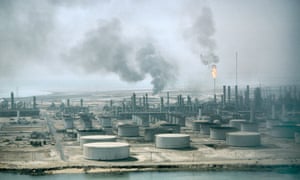Patrick Collinson- The Guardian
Pension funds will be stuffed with Saudi Aramco shares after the oil giant’s floatation this weekend

On Sunday, the baroque-and-bling Ritz-Carlton in Riyadh (suites a mere £6,500 a night) is expected to host the launch of the biggest privatisation in history. Aramco, the holder of Saudi Arabia’s oil reserves, is likely to come to the market with a price tag as high as $2 trillion.
The kingdom is only selling a small portion of the company, but if it achieves anywhere near that price, Aramco will be valued at more than BP, Shell, Google, Walmart and Netflix combined.
It’s a monster. It is easily the world’s worst polluter, topping the Guardian’s list of the 20 biggest companies responsible for a third of all the planet’s carbon emissions since 1965. Aramco is head and shoulders above the rest, and is behind nearly 5% of all global emissions over the last half century.
You don’t have to sign up to Extinction Rebellion to know that if we burn all the oil in Saudi Arabia’s vast reserves, we’re never going to tackle the climate emergency. Yet Aramco just recently agreed to spend $18bn to massively expand production at two of its oilfields.
Putting aside – if you can – the murder of the Washington Post columnist Jamal Khashoggi, the croneyism of an autocratic state and the proxy wars – even on a cold-headed financial calculation, investing in Aramco could well be a dud.
The era of oil is coming to an end. The Saudi Arabians are cute, flogging it off now, because although it may be the world’s most profitable company at present, it could be worthless within 50 years. At some point there is going to be a global switchover to electric cars. Offshore windfarms, we’re told, can provide more electricity than the world needs. Aramco’s vast reserves will be left in the ground, and we’ll all be quoting Ozymandias: “Round the decay Of that colossal Wreck, boundless and bare The lone and level sands stretch far away.”
Yet the way our asset management industry runs, virtually every company employee with a pension scheme will, over the coming months and years, see it stuffed with Aramco shares – whether they like it or not.
It’s partly the fault of indexing. Much of our company pension money now goes straight into global index funds, which can’t help but buy into Aramco to fulfil their mandate of matching moves in stock market indices. But even when pension activists try to stop their money going into fossil fuels, they are usually stumped.
Greta Thunberg sails the Atlantic, speaks to the UN and inspires a whole generation. Climate activists take direct action in cities across the world. But they are no match for the stonewalling, evasiveness and sheer truculence of the fund managers who could have the most immediate effect on the world’s biggest polluting companies.
Classical economics says that as shareholder-owners we can tell the boards of these companies what to do – from cutting pollution and carbon emissions to setting caps on runaway executive pay. And we can choose to buy or sell out whenever we like.
Like hell we can. Currently there are almost no company pension schemes in Britain that allow the employee to stop their money going into fossil fuel extraction. It’s also virtually impossible to get fund managers to use their votes to take even the mildest steps towards fighting climate change or voting down excessive corporate pay.

One group, which represents hundreds of UK company trustees with ownership of around £750bn worth of shares, contacted me this week with its deep, deep frustration at being able to effect any change, despite nominally owning vast amounts of shares.
The group, the Association of Member Nominated Trustees, a few years ago set out its Red Lines when it came to voting. None of them is especially radical. They ask that fund managers vote against pay levels that are more than 100 times the UK’s average wage, and if they don’t, to report back to shareholders why not. Given the UK’s average wage is around £29,000, that limits chief executive pay to just shy of £3m.
On climate change, it doesn’t ask for divestment. It just asks that if a company has failed to introduce an emissions reduction target, and is failing to take action to stop the planet warming by 2C, then the fund manager must vote against the re-election of the chair of the environmental sustainability committee of the offending company.
Yet even these mild measures are usually blocked. When the AMNT surveyed fund managers, it found half did not even have a climate change voting policy. Aramco will hardly be quaking in its boots. Instead, the attention of Wall Street and London’s bankers will be on the $450m fees bonanza the Saudi government will shell out to get Aramco launched on global markets.
Many people will regard it as hypocritical to divest from fossil fuels when so many of us drive cars and fly off on holidays. Maybe they also think corporate pay packets are just the going rate for the job. But for those who think otherwise, there’s a need to have bolder, simpler and more accessible ways to opt out of investing in the likes of Aramco if they wish. It is their money, after all.
One final word of caution. Back in 2000, tobacco companies looked like history as cigarette bans took hold in western countries. Yet in the following decade, British American Tobacco was the very best performer on the London Stock Exchange, with its shares soaring and dividends gushing. It was morally and ethically right to divest from tobacco, but not (at first) financially. The same may well be said about Aramco.


Leave A Comment